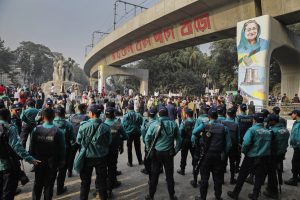Sheikh Hasina has been sworn in as Bangladesh’s prime minister for the fifth time following a highly controversial election held on January 7.
The Awami League (AL), which she leads, won 222 of 300 (almost 75 percent) seats in Parliament. Independents won 62 seats and the Jatiya Party, known as “the ruling party’s managed opposition,” secured 11 seats. The 62 elected independent candidates too are AL politicians, who after failing to receive the party nomination, opted to contest the election to challenge AL nominees. According to the Election Commission, there was 41.8 percent voter turnout; independent observers say it was much lower.
The election result was expected. The opposition Bangladesh Nationalist Party (BNP) boycotted the election. In an interview with The Diplomat, the BNP’s acting Chairman Tarique Rahman said that “as long as Hasina retains power, every election in Bangladesh will involve extensive irregularities, making the much-anticipated level-playing field a distant dream.”
In the run-up to the elections, the Hasina government left no stone unturned to weaken the BNP. The BNP claimed that over 20,000 of its members, including Secretary General Mirza Fakhrul Islam Alamgir and several members of the Standing Committee, the party’s highest decision-making body, were detained and jailed. Human Rights Watch called the government’s repressive campaign a violent autocratic crackdown ahead of the election.
In a post-election press conference, Hasina claimed that “the election was free and fair.”
Without a credible opposition in the Parliament, Bangladesh is now effectively a one-party state. In the coming days, it will be interesting to see how the geopolitics around Bangladesh and its politics will unfold under one-party rule.
International responses to the Bangladesh election prior to the vote offer some clues. India, China, and Russia had strongly backed the continuation of Hasina’s government, while the United States was pressing for a free and fair election.
Following the vote, the U.S. State Department explicitly said the elections were not free or fair. The U.K., Canada, and Australia also criticized the election and the repression unleashed on the opposition. The statement from top EU officials is timid. The point to note, though, is that despite their criticism, all the Western powers have expressed interest in continuing their engagement with Hasina.
India, China, and Russia were quick to congratulate Hasina. In a post on X, formerly Twitter, Indian Prime Minister Narendra Modi said he is “committed to further strengthen our enduring and people-centric partnership with Bangladesh.” Indian External Affairs Minister S. Jaishankar met the newly-appointed Bangladesh Foreign Minister Mohammed Hasan Mahmud and stressed that the Bangladesh-India relationship is “growing from strength to strength.”
In addition to congratulating Hasina, China’s Vice Minister of the Chinese Communist Party Sun Haiyan visited Bangladesh on January 23. A day earlier, Bangladesh’s Home Minister Asaduzzaman Khan was honored with the Great Wall Commemorative Medal.
U.S. Ambassador Peter Haas, who was subjected to harassment and violent rhetoric from the ruling party because he supported a free and democratic Bangladesh, congratulated Hasina and met ministers to reiterate the U.S. commitment to work closely with Bangladesh.
These are early days. However, it seems that the United States is softening its tough stance on democracy and human rights in Bangladesh and will remain engaged with the Hasina government.
It is evident that India has placed all their bets on the AL. Whether it is a prudent foreign policy strategy only time will tell.
India strongly supported the AL in Bangladesh’s previous elections as well, including the controversial elections in 2014 and 2018. By putting all its eggs in the AL basket, India has limited its influence in Bangladesh to the ruling party.
Meanwhile, the BNP is slowly drumming up criticism of India. In a recent press conference, a BNP spokesperson said that “people lose voting rights due to India’s interference.”
Bangladesh’s influential political YouTube commentator Pinaki Bhattacharya has called for a boycott of Indian products in Bangladesh. Several accounts on X are using the hashtag #Indiaout, mimicking the Maldivian example. Though these campaigns are yet to garner widespread public participation, they are laying the foundation by pointing to alleged Indian support for Bangladesh’s one-party state.
It is likely that as anti-Indian sentiment gathers momentum in Bangladesh, India will support the AL even more strongly, even as the AL will build on the leverage it has of balancing Indian influence with Chinese friendship. At the moment, despite being a regional power and an influential powerbroker on the global stage, India does not have any leverage in Bangladesh beyond the AL.
The United States is seemingly sitting on the fence, observing.
Unrest looms. The price of essential commodities is rising even as the dollar crisis worsens. Anger among the kin of thousands of opposition leaders unfairly detained is mounting. Infighting between the AL and its dissidents who contested as independent candidates is growing too. The much-touted “stability” under the AL may prove to be fragile in the coming months.
Fragile stability is bad news for business and foreign investors. Therefore, it will be prudent for the AL to bring political pluralism back to the country.

































